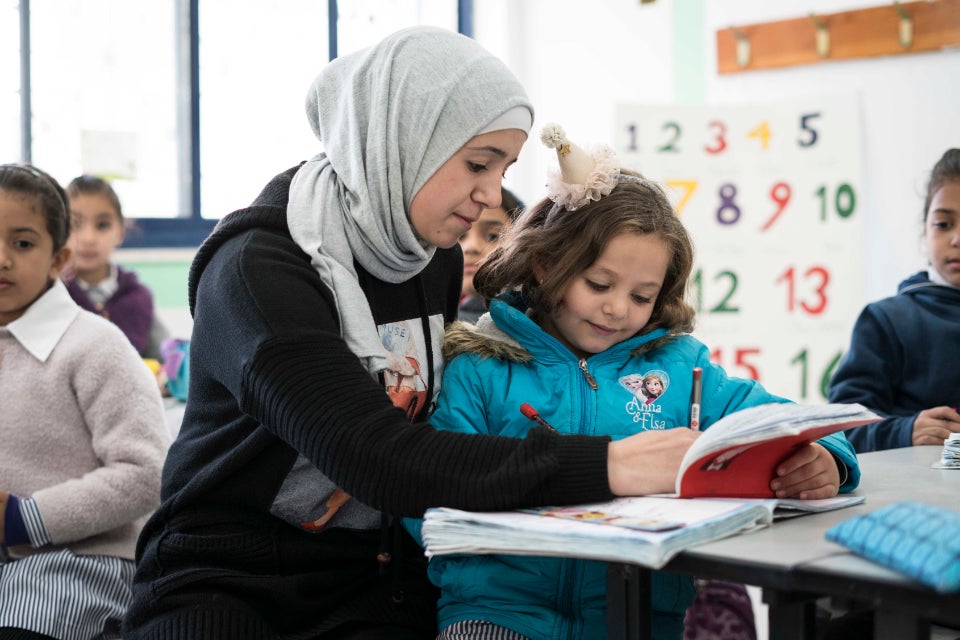Preventing violence through education in the West Bank
Violence severely affects women, girls, men, and boys in the West Bank and Gaza Strip. The COVID-19 pandemic has particularly exacerbated violence against women and girls. In partnership with UNFPA through the HAYA Joint Programme, the Ministry of Education and NGO Juzoor for Social Health and Development are training teachers and counselors to prevent and respond to violence in their schools.Date:

Violence inflicts harm on women, girls, men, and boys of all ages throughout the world. Since the outbreak of COVID-19, violence against women and girls has intensified and violence against school children in and outside the home is no exception.
According to a survey by Palestinian Central Bureau of Statistics, in the West Bank and Gaza Strip, children aged 11 years and under are especially vulnerable, with 74 per cent of girls and 79 per cent of boys having experienced psychological violence. Another 62 per cent of girls and 68 per cent of boys have been subjected to physical violence.
UNFPA is partnering with the Ministry of Education and non-governmental organization Juzoor for Social Health and Development, through the HAYA Joint Programme, to train teachers to prevent violence and appropriately respond to cases of violence in their schools.
“If students understand the concepts of social justice and respectful relationships, then they will find alternative ways to expressing their feelings and dealing with issues rather than using violence,” says Ms. Hilda Awwad, Head of Division for Monitoring and Auditing at the Ministry of Education.
Kristine Blokhus, UNFPA Representative to Palestine, agrees. “Preventing gender-based violence is not a simple intervention. It requires profound changes to beliefs and attitudes about equality, respect and relationships. Reaching young people while these beliefs are still being shaped is more effective than trying to change the mindsets of adults.”
Ms. Marina Zayed, Juzoor’s Project Manager for its Community Development Unit says misconceptions around violence are not exclusive to students, “When it comes to the topic of GBV, you are working on ideas and beliefs that exist within the male and female teachers.”
In this context, a training manual on gender-based violence has become a key tool in changing things for the better. Initially developed by World Vision, then updated within the framework of the HAYA Joint programme, the manual has been used by thirty schools throughout East Jerusalem and the West Bank, not only by teachers and counsellors, but also by principals, parents, and their children. It explains the meaning of gender-based violence and the situation in the West Bank and Gaza Strip, including innovative tools and activities, such as storytelling and drama exercises for children.
“This manual will institutionalize the process of developing teachers’ capacity and engage them in efforts to eliminate violence and increase teachers’ awareness on gender issues and social justice,” says Ms. Rehab Sandouka, Juzoor Manager of Social Development. It is expected that this manual will especially help children to better understand the concept of violence, as well as societal roles, and foster relationships focused on gender equality. “This thinking will hopefully trigger a deeper consideration among students about these values and will contribute to the continuing national efforts to change gender concepts and social norms,” add Ms. Sandouka.
Within the context of the programme, teachers from seven different schools joined an online training which allowed them to familiarize themselves more thoroughly with the manual and its contents. This is the first of several trainings that will build the capacity of teachers and counsellors on the various forms of violence, how to recognize cases of violence, and mechanisms to report these cases in line with the Ministry’s policies. These teachers and counsellors will then become trainers to promote a better understanding of violence in their own schools.
“If we work on the attitudes and perceptions of teachers and principals, then we can definitely change the attitudes and perceptions of the students,” says Ms. Awwad.
Funded by the Government of Canada and jointly implemented by UN Women, UNFPA, UN-Habitat, and UNODC, the HAYA Joint Programme seeks to end violence against women and girls through various outreach and awareness-raising activities, to increase access to necessary services for survivors of violence, as well as to strengthen the institutional capacity of government officials to develop and implement legal and policy frameworks promoting and protecting women’s and girls’ rights to live free from violence.
Read in Arabic.